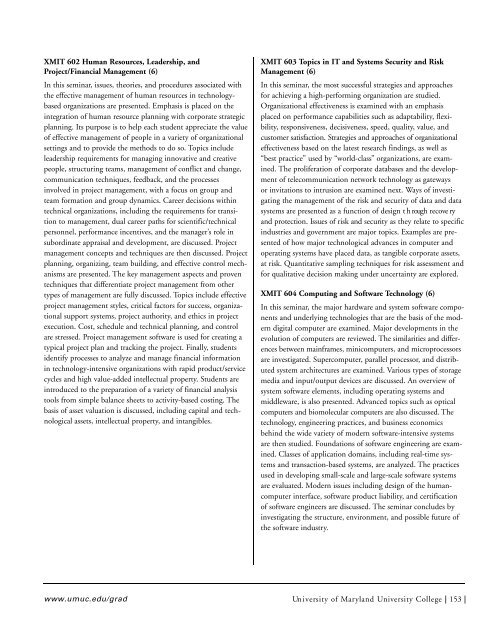A+B. Intro_SJ.1 - University of Maryland University College
A+B. Intro_SJ.1 - University of Maryland University College
A+B. Intro_SJ.1 - University of Maryland University College
Create successful ePaper yourself
Turn your PDF publications into a flip-book with our unique Google optimized e-Paper software.
XMIT 602 Human Resources, Leadership, and<br />
Project/Financial Management (6)<br />
In this seminar, issues, theories, and procedures associated with<br />
the effective management <strong>of</strong> human resources in technologybased<br />
organizations are presented. Emphasis is placed on the<br />
integration <strong>of</strong> human resource planning with corporate strategic<br />
planning. Its purpose is to help each student appreciate the value<br />
<strong>of</strong> effective management <strong>of</strong> people in a variety <strong>of</strong> organizational<br />
settings and to provide the methods to do so. Topics include<br />
leadership requirements for managing innovative and creative<br />
people, structuring teams, management <strong>of</strong> conflict and change,<br />
communication techniques, feedback, and the processes<br />
involved in project management, with a focus on group and<br />
team formation and group dynamics. Career decisions within<br />
technical organizations, including the requirements for transition<br />
to management, dual career paths for scientific/technical<br />
personnel, performance incentives, and the manager’s role in<br />
subordinate appraisal and development, are discussed. Project<br />
management concepts and techniques are then discussed. Project<br />
planning, organizing, team building, and effective control mechanisms<br />
are presented. The key management aspects and proven<br />
techniques that differentiate project management from other<br />
types <strong>of</strong> management are fully discussed. Topics include effective<br />
project management styles, critical factors for success, organizational<br />
support systems, project authority, and ethics in project<br />
execution. Cost, schedule and technical planning, and control<br />
are stressed. Project management s<strong>of</strong>tware is used for creating a<br />
typical project plan and tracking the project. Finally, students<br />
identify processes to analyze and manage financial information<br />
in technology-intensive organizations with rapid product/service<br />
cycles and high value-added intellectual property. Students are<br />
introduced to the preparation <strong>of</strong> a variety <strong>of</strong> financial analysis<br />
tools from simple balance sheets to activity-based costing. The<br />
basis <strong>of</strong> asset valuation is discussed, including capital and technological<br />
assets, intellectual property, and intangibles.<br />
XMIT 603 Topics in IT and Systems Security and Risk<br />
Management (6)<br />
In this seminar, the most successful strategies and approaches<br />
for achieving a high-performing organization are studied.<br />
Organizational effectiveness is examined with an emphasis<br />
placed on performance capabilities such as adaptability, flexibility,<br />
responsiveness, decisiveness, speed, quality, value, and<br />
customer satisfaction. Strategies and approaches <strong>of</strong> organizational<br />
effectiveness based on the latest research findings, as well as<br />
“best practice” used by “world-class” organizations, are examined.<br />
The proliferation <strong>of</strong> corporate databases and the development<br />
<strong>of</strong> telecommunication network technology as gateways<br />
or invitations to intrusion are examined next. Ways <strong>of</strong> investigating<br />
the management <strong>of</strong> the risk and security <strong>of</strong> data and data<br />
systems are presented as a function <strong>of</strong> design t h rough re c ove ry<br />
and protection. Issues <strong>of</strong> risk and security as they relate to specific<br />
industries and government are major topics. Examples are presented<br />
<strong>of</strong> how major technological advances in computer and<br />
operating systems have placed data, as tangible corporate assets,<br />
at risk. Quantitative sampling techniques for risk assessment and<br />
for qualitative decision making under uncertainty are explored.<br />
XMIT 604 Computing and S<strong>of</strong>tware Technology (6)<br />
In this seminar, the major hardware and system s<strong>of</strong>tware components<br />
and underlying technologies that are the basis <strong>of</strong> the modern<br />
digital computer are examined. Major developments in the<br />
evolution <strong>of</strong> computers are reviewed. The similarities and differences<br />
between mainframes, minicomputers, and microprocessors<br />
are investigated. Supercomputer, parallel processor, and distributed<br />
system architectures are examined. Various types <strong>of</strong> storage<br />
media and input/output devices are discussed. An overview <strong>of</strong><br />
system s<strong>of</strong>tware elements, including operating systems and<br />
middleware, is also presented. Advanced topics such as optical<br />
computers and biomolecular computers are also discussed. T h e<br />
technology, engineering practices, and business economics<br />
behind the wide variety <strong>of</strong> modern s<strong>of</strong>tware-intensive systems<br />
are then studied. Foundations <strong>of</strong> s<strong>of</strong>tware engineering are examined.<br />
Classes <strong>of</strong> application domains, including real-time systems<br />
and transaction-based systems, are analyzed. The practices<br />
used in developing small-scale and large-scale s<strong>of</strong>tware systems<br />
are evaluated. Modern issues including design <strong>of</strong> the humancomputer<br />
interface, s<strong>of</strong>tware product liability, and certification<br />
<strong>of</strong> s<strong>of</strong>tware engineers are discussed. The seminar concludes by<br />
investigating the structure, environment, and possible future <strong>of</strong><br />
the s<strong>of</strong>tware industry.<br />
w w w. u m u c . e d u / g r a d<br />
Un i versity <strong>of</strong> Ma r yland Un i versity <strong>College</strong> | 153 |

















